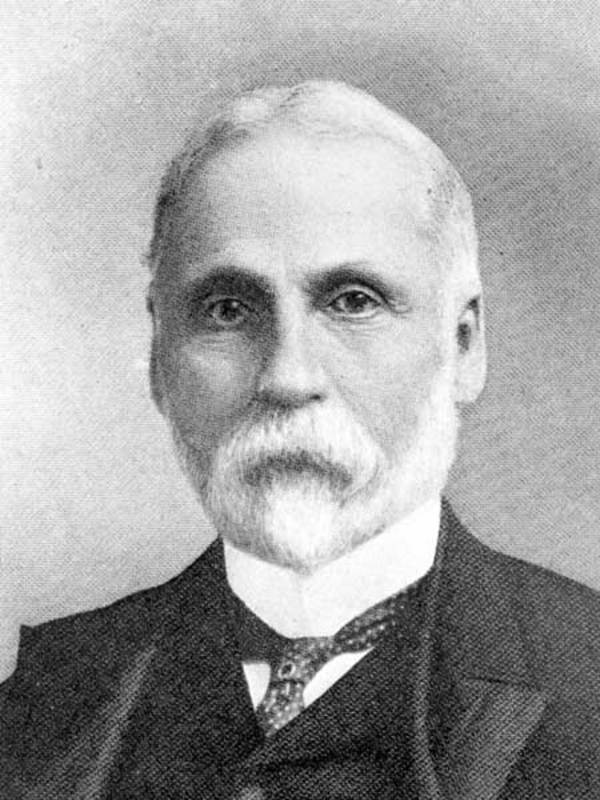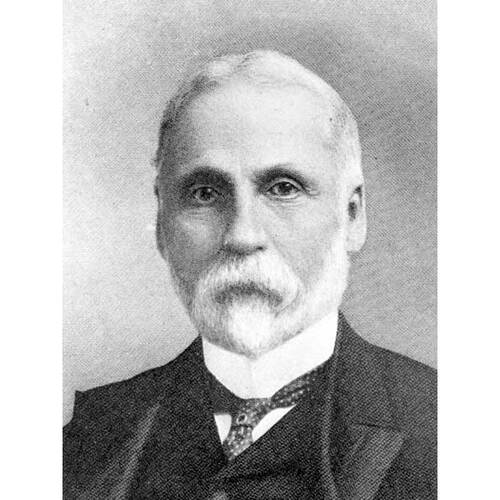
Source: Link
HAGEL, NATHANIEL FRANCIS (until about 1876 he signed his family name Hagle), lawyer; b. 20 Feb. 1846 in Hagle’s Corners, near Ingersoll, Upper Canada, second son of Samuel Hagle and Eliza Ann Tapley; m. 13 Sept. 1870 Susan Adeline Summers in London, Ont., and they had at least two daughters and one son; d. 27 Jan. 1915 in Winnipeg and was buried in St John’s cemetery.
Nathaniel Francis Hagel, whose four grandparents were descendants of United Empire Loyalists, was educated in Ingersoll and Woodstock. He decided to become a lawyer, contrary to his father’s wishes, so at age 17 he left home. After supporting himself as an actor and a schoolteacher, he became an articled law student in Woodstock and later in Toronto. He was admitted attorney in 1872 and called to the Ontario bar the following year. For the next eight years he practised mostly criminal law in Toronto.
In the fall of 1881, lured by the excitement of the west, Hagel moved to Winnipeg. Called to the Manitoba bar in February 1882, he started the law firm of Hagel, Henderson, and Delahaye, and later formed partnerships with other lawyers. He continued in criminal law, which he practised with such success that he came to be regarded as “one of the most brilliant members of the profession in Canada.” He was appointed a qc on 23 Oct. 1885.
Especially effective in trials before a jury, Hagel was a daring but always scrupulous and courteous fighter for his client and a master of cross-examination. His eloquence could move a jury to tears, his deep, resonant voice quoting the Bible and Shakespeare while pleading for his client. He appeared for the defence in 76 murder trials and only one of his clients was hanged. Hagel was not a “black-letter” lawyer, however, and he disliked spending much time preparing cases. Instead, he relied on his quick intelligence and his profound knowledge of the law of evidence for success in his courtroom appearances.
In politics, Hagel was a lifelong Conservative, taking an active interest in party affairs. He served for many years as vice-president of the party in Manitoba, and in the Yukon he was to organize the Dawson City Conservative Club, serving as its first president. He ran for the party in two provincial elections in Manitoba: in Rockwood in 1886 and in Kildonan in 1891. Both times he was defeated by narrow margins – only seven votes in Kildonan – amid rumours of unfair electoral practices.
A restless man, Hagel moved to Vancouver in 1898 and then to Dawson in 1900. While in Dawson he became an ardent horticulturist and demonstrated that there was much potential in the north for agriculture. To further his ideas he became president of the Yukon Horticultural and Floral Association and the Yukon International Polar Institute.
Hagel practised successfully in both cities until his return to Winnipeg in late 1905. His health was poor and he never regained the high profile of his earlier years. In March 1914 one of his last cases involved his son, Percy Elden, also a lawyer in Manitoba. The son was accused of smuggling in a gun and a rope to assist in the escape of John Krafchenko, in jail on the charge of murdering a bank manager in Plum Coulee, Man. The senior Hagel assisted a former partner, Robert Andrew Bonnar, in the defence, but his son was found guilty and sentenced to three years at Stony Mountain Penitentiary. Nathaniel Francis Hagel suffered a paralytic stroke in the fall of 1914 and died late in January the following year.
Arch. of Manitoba Legal Hist. (Winnipeg), A21 (Percy Hagel, “Gold dust to ashes”); A309-1-A (materials regarding disbarment of R. L. Ashbaugh); A408 (letter from G. H. Kenny to Law Soc. of Manitoba); A702 (petition of N. F. Hagel, 15 Feb. 1884); A703–4 (petition of N. F. Hagel, 15 Sept. 1883); A719-15 (letter from N. F. Hagel to W. W. Taylor); A2184 (John Krafchenko, the Canadian outlaw [pamphlet]); Biog. cards; Law Soc. of Manitoba, files; minute-books; Scrapbooks. NA, RG 31, C1, 1891, Winnipeg. PAM, GR 4347; MG 12, E1, corr. and papers: 8295–96. Univ. of Man. Libraries, Dept. of Arch. and Special Coll. (Winnipeg), mss 48 (Pitblado family coll.), box 4. Manitoba Free Press, 1882–87, 1890–92, 1899–1900, 1906, 1913–15. Winnipeg Free Press, 1944. Winnipeg Tribune, 1912, 1915. George Bryce, A history of Manitoba; its resources and people (Toronto and Montreal, 1906). Canadian album (Cochrane and Hopkins). Canadian men and women of the time (Morgan; 1898). Directory, Winnipeg, 1882–83, 1887, 1891–97, 1907. Dale and Lee Gibson, Substantial justice; law and lawyers in Manitoba, 1670–1970 (Winnipeg, 1972). F. H. Schofield, The story of Manitoba (3v., Winnipeg, 1913). R. St G. Stubbs, “The late N. F. Hagel,
Cite This Article
Lee Gibson, “HAGEL (Hagle), NATHANIEL FRANCIS,” in Dictionary of Canadian Biography, vol. 14, University of Toronto/Université Laval, 2003–, accessed December 30, 2025, https://www.biographi.ca/en/bio/hagel_nathaniel_francis_14E.html.
The citation above shows the format for footnotes and endnotes according to the Chicago manual of style (16th edition). Information to be used in other citation formats:
| Permalink: | https://www.biographi.ca/en/bio/hagel_nathaniel_francis_14E.html |
| Author of Article: | Lee Gibson |
| Title of Article: | HAGEL (Hagle), NATHANIEL FRANCIS |
| Publication Name: | Dictionary of Canadian Biography, vol. 14 |
| Publisher: | University of Toronto/Université Laval |
| Year of publication: | 1998 |
| Year of revision: | 1998 |
| Access Date: | December 30, 2025 |



